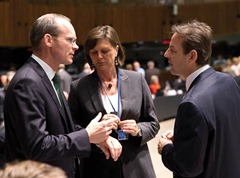CAP reform agreement: devil in the detail
 A CAP reform deal was announced by Simon Coveney in June but the details will only become clear over the coming months. Richard Halleron gathers the views of the Minister and the IFA.
A CAP reform deal was announced by Simon Coveney in June but the details will only become clear over the coming months. Richard Halleron gathers the views of the Minister and the IFA.
The fine detail of the recently agreed Common Agricultural Policy (CAP) review will not be sorted out until, at least, November. However, Farm Minister Simon Coveney is already hailing the deal as a ‘good news’ story for Irish agriculture.
Significantly, he has confirmed that the new CAP measures, which will not be implemented until 2015, should allow Irish agriculture to meet the growth targets set down within the Harvest 2020 report.
This strategy document for the agri-food sector – published three years ago – envisages a more than significant expansion in food output being achieved over the next seven years, with the 50 per cent growth target for milk being the figure that has received most public scrutiny.
But before considering the specific impact of the CAP deal here in Ireland, the key role played by Simon Coveney in getting the entire ‘review bandwagon’ over the finishing line during Ireland’s Presidency of the EU must be put on the record. This achievement speaks volumes for his ability, both as a forward thinker and diplomat. Moreover, the successful culmination of the CAP deal also reflects the respect in which Ireland is still held throughout the EU, despite the continuing fall-out from the banking crisis.
The reform package itself is centred on two fundamental principles: the introduction of an area-based support system for farmers, which removes all vestiges of historic production practices, and the provision of enhanced support levels for more environmentally friendly production practices. Significantly, these measures – plus the myriad associated regulations to be agreed over the coming months – can be implemented by the various member states with a very strong regional bias. But overriding all of this is the recent budget deal struck by EU heads of state and government, which could see direct support levels to Irish agriculture dropping by 6 per cent between now and 2020.
Landmark
Simon Coveney believes the attainment of the new reform measures represents a landmark development in the evolution of the CAP.
“In the first instance it will allow Irish agriculture and food to expand profitably at a time of fast growing demand for high quality food products in countries around the world,” he told eolas.
“The agreement represents a hugely significant development in the history of the CAP. For the first time, the three European institutions have come together to agree the framework for the development of the European agriculture sector and they have delivered a policy that I believe secures the sustainable development of the sector up to 2020 and beyond.”
He continued: “The redistribution of direct payments was the most difficult issue for Ireland in these negotiations. I am very pleased that the final agreement, involving a combination of the Irish model and the 60 per cent minimum payment, will allow us to achieve the twin objectives of making the direct payments system fairer while not undermining the efforts of those in receipt of higher payments to develop their farming enterprises.”
Simon Coveney concluded: “What we have here is a very balanced package. The various elements – from the greening of direct payments, through our treatment of active, small and young farmers to the modernisation of the way in which we implement rural development programmes and monitor the financing and implementation of the CAP – demonstrate how a constructive approach by the European institutions can provide a very positive and modern framework for the ongoing development of the agriculture sector.
“I am confident that farmers throughout the European Union will benefit from these developments, and that European citizens can be assured that resources are being spent in an efficient, equitable and sustainable manner.”
Irish Farmers’ Association (IFA) President John Bryan, however, has a slightly different take on the outcome of the CAP reform negotiations. Over recent weeks he has dismissed the spin which, he claims, is being put on the CAP reform deal by some government TDs, saying the reality is that over 75,000 farmers will have some level of cuts imposed on them.
“Over 50,000 farmers are facing severe cuts to their incomes, ranging from 15 per cent to 35 per cent, and to say this group will only have an average cut of 12 per cent is downright disingenuous. This claim takes no account of other compulsory deductions that farmers will face as part of the CAP reform and the overall budget agreement,” he explained.
“The facts are that the deal recently agreed in Brussels and Luxembourg will impact very negatively on the farm incomes of our most active and productive farmers, and threaten the targets in Food Harvest 2020.”
Bryan went on to claim that the CAP reform agreement fails totally to address low incomes in vulnerable sectors and it is now up to Minister Coveney to bring forward a set of national measures to deal with this reality.
But the IFA President was also quick to recognise the work put in by Simon Coveney on the CAP reform issue since the beginning of this year:
“Since the CAP reform, Commission proposals first emerged, significant progress has been made to minimise the damage to Irish agriculture. Minister Coveney and his officials have worked hard to secure the compromises necessary to deliver a deal in what has been a complex, difficult and damaging CAP reform,” he commented
John Bryan also said the Minister and the Government must now commit to 50:50 co-financing of the rural development measures, dealt with under the CAP reform, so as to help vulnerable farming sectors and to encourage investment in agriculture over the next number of years.
“A lot of work will now be required to ensure the smooth implementation of these measures and [the] IFA would be insisting that no extra bureaucracy or administrative burdens are imposed on farmers,” he remarked.
“Market supports have a strong part to play in mitigating price volatility, and they must not be eroded. Also, production management ideas promoted by the European Parliament, which suggest that production increases may be penalised post-quotas, must be fully opposed by Minister Coveney.”
Bryan concluded: “In my opinion, these reforms have sent the CAP in the wrong direction. Farmers right around Europe will have to start a campaign now to re-focus the CAP towards supporting sustainable food production.”






